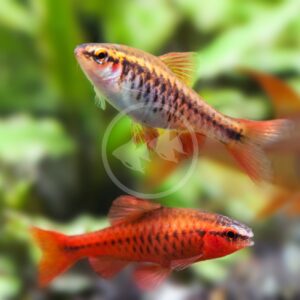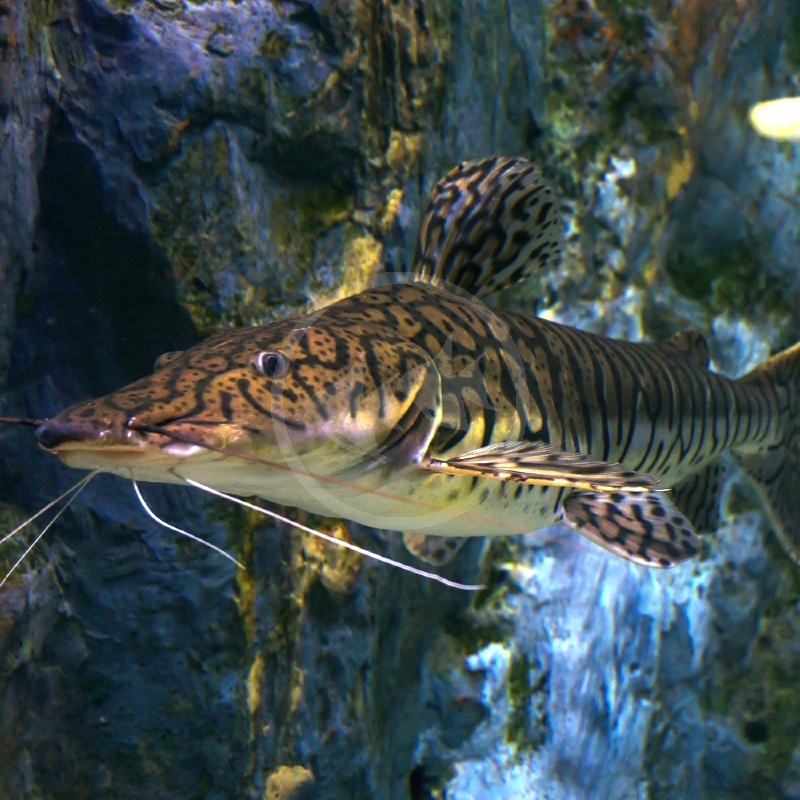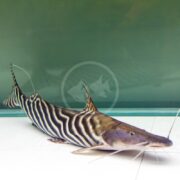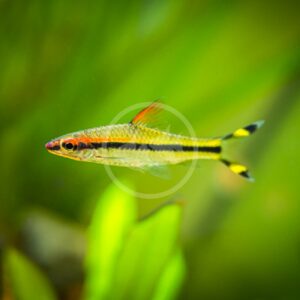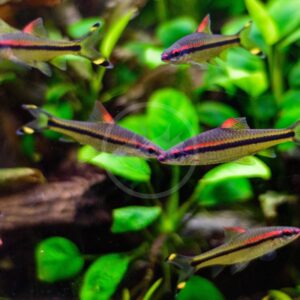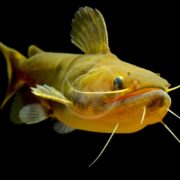
CATFISH – SHOVELNOSE TIGER
Pseudoplatystoma fasciatum
$29.99 – $119.99Price range: $29.99 through $119.99
The Tiger Shovelnose Catfish has an incredibly large natural range throughout rivers and lakes of South America. Given this distribution, there is a lot of variation in the color and patterning among individual Tiger shovelnose catfish. Often sold as mere several inch “kittens”, this catfish species is truly a river monster that is best left admired in the wild, public aquaria or to the few extremely dedicated aquarists that have the facilities to house an adult Tiger shovelnose catfish. On average, an adult Tiger shovelnose catfish in captivity can grow to 3 feet in length, weighing up to 140 pounds. The myth that this species, among so many other large fishes, will only grow to the size of the aquarium that they are in is just that – a myth. Juvenile Tiger shovelnose catfish grow up quicker than you think, especially when their diets are being supplemented correctly, making this fish a serious commitment in all aspects of aquatic husbandry (please see ‘Diet and Care Requirements’ below). For its enormous adult size however, the Tiger shovelnose catfish is a relatively non-aggressive fish so long as it is not kept with tank mates that can become a meal. We do not recommend keeping any other type of catfish with a Tiger shovelnose catfish because this will likely result in a territorial dispute. Diagnosable differences between male and female Tiger shovelnose catfish are unknown and successful breeding of this species in an artificial environment is extremely unlikely. Note: Populations of Tiger shovelnose catfish have been found within rivers and ponds of the United States likely as a result from irresponsible hobbyists releasing specimens that got too large to care for. While these catfish will not survive in colder regions such as Wisconsin, those in warmer regions could and this is unhealthy for the biodiversity of our native ecosystems. We urge hobbyists to not do this, and to please reach out to our store, Aquatics Unlimited, to either surrender your catfish to us or for resources to help you with your catfish.
Care Level: Advanced
Temperament: Semi-Aggressive
Live Plant Safe: No
General Description: The Tiger Shovelnose Catfish has an incredibly large natural range throughout rivers and lakes of South America. Given this distribution, there is a lot of variation in the color and patterning among individual Tiger shovelnose catfish. Often sold as mere several inch “kittens”, this catfish species is truly a river monster that is best left admired in the wild, public aquaria or to the few extremely dedicated aquarists that have the facilities to house an adult Tiger shovelnose catfish. On average, an adult Tiger shovelnose catfish in captivity can grow to 3 feet in length, weighing up to 140 pounds. The myth that this species, among so many other large fishes, will only grow to the size of the aquarium that they are in is just that – a myth. Juvenile Tiger shovelnose catfish grow up quicker than you think, especially when their diets are being supplemented correctly, making this fish a serious commitment in all aspects of aquatic husbandry (please see ‘Diet and Care Requirements’ below). For its enormous adult size however, the Tiger shovelnose catfish is a relatively non-aggressive fish so long as it is not kept with tank mates that can become a meal. We do not recommend keeping any other type of catfish with a Tiger shovelnose catfish because this will likely result in a territorial dispute. Diagnosable differences between male and female Tiger shovelnose catfish are unknown and successful breeding of this species in an artificial environment is extremely unlikely. Note: Populations of Tiger shovelnose catfish have been found within rivers and ponds of the United States likely as a result from irresponsible hobbyists releasing specimens that got too large to care for. While these catfish will not survive in colder regions such as Wisconsin, those in warmer regions could and this is unhealthy for the biodiversity of our native ecosystems. We urge hobbyists to not do this, and to please reach out to our store, Aquatics Unlimited, to either surrender your catfish to us or for resources to help you with your catfish.
Diet Requirements: Tiger shovelnose catfish are fish-eaters by nature, but will usually adapt to a protein-rich prepared diet in captivity. Such options include frozen brine shrimp, mussels, krill, silverside fish, and prawns. Foods containing Spirulina algae are a plus. Appropriate frozen food options will vary depending on the size of your specimen. Adult Tiger shovelnose catfish can also be fed pieces, or whole, white fish fillets from the grocery store. Tiger shovelnose catfish may accept large sinking pellet foods, but these should not make up the majority of their diet. Live earthworms are a favorite treat. Variety is the spice of life in order to maintain color, immune function and longevity of your fish. This is extremely important for a Tiger shovelnose catfish because an individual with no variety will become picky and refuse options of other food as it matures. We discourage feeding live fish to Tiger shovelnose catfish because they are often of little nutritional value and increase the risk of introducing disease. Tiger shovelnose catfish are notorious for becoming greedy and will often learn to “beg” for food, but feeding only once a day should be exercised for juveniles. Adult specimens may only need to be fed once a week. Obesity is a big problem in large catfish species, which will only be a detriment to their health in the long run. Do not feed any form of mammalian/poultry meat (e.g., beef or chicken) as certain lipids in these cannot be metabolized by the Tiger shovelnose catfish.
Care Requirements: A minimum 90 gallon aquarium is needed at the very least for a small Tiger shovelnose catfish. A more subadult specimen will require a 250+ gallon aquarium. The realistic long term accommodations for a juvenile Tiger shovelnose catfish to mature into a 3 foot adult in length requires a phenomenal volume of water of at least a couple thousand gallons – which still barely allows for natural movement as it would freely in the wild. This catfish cannot be put into a biologically immature aquarium. Weekly water changes are necessary to keep water parameters pristine (Nitrates < 15 ppm) as Tiger shovelnose catfish do not like high nitrates and deteriorating water parameters. Equipping the aquarium with several canister filters, or a sump system, is also needed to maintain a healthier environment for this species and combat the amount of waste it produces. A Tiger shovelnose catfish will be relatively indifferent to decor, especially as an adult, but some stacked rocks to create caves for younger specimens to hide, or driftwood, may add some pizzazz to the aquarium. A lot of unobstructed and open swimming space should be of priority, and a sandy or fine substrate is needed, because gravels can be ingested by more mature specimens and get caught in their delicate gill tissue. Tiger shovelnose catfish are compatible with a wide variety of fish; tank mates should not be aggressive as to nip at the Tiger shovelnose catfish’s delicate and sensitive whiskers, or too small to be consumed. Tiger shovelnose catfish are solitary, so no more than one should be considered per aquarium. Recommended water conditions, 72-78° F, KH 2-30, pH 6.0-7.5.
Purchase Size: Small: 2” to 2-3/4”; Medium: 3” to 4”
Note: Your item may not look identical to the image provided due to variation within species. Purchase sizes are approximate.
Dry goods orders are shipped via US Postal Service or UPS to the address provided at checkout based on the selection made in your website shopping cart. Product is carefully packed to help prevent any damage during shipping. Once processed you will receive a shipment notification via email with tracking number, and delivery notification. Please allow 48 hours for processing after your order is placed.
Perishable items (i.e. live plants, refrigerated/frozen foods) are shipped via US Postal Service 2-3 day to the address provided at checkout for a $25.00 flat rate charge. Items are packed with secure packing material and heat, cold, or Cryo packs as needed to maintain safe temperatures during transit. If one or more perishable items are in the shopping cart at checkout the $25.00 perishable shipping charge will automatically appear and need to be selected. Once processed you will receive a shipment notification via email with tracking number. Please allow 48 hours for processing after your order is placed.
Livestock (i.e. fish, invertebrates, coral) are shipped via UPS Overnight to the address provided at checkout for a $55.00 flat rate charge. Livestock is packed in insulated styrofoam boxes with secure packing material and heat, cold, or Cryo packs as needed to maintain safe temperatures during transit. If one or more livestock items are in the shopping cart at checkout the $55.00 livestock shipping charge will automatically appear and need to be selected. Livestock is shipped Monday through Wednesday ONLY (no weekend delivery is available) weather permitting, and we reserve the right to delay shipping until conditions are appropriate for safe arrival. Once your order is placed we will contact you to arrange the best shipping date based on these criteria. Someone must be available to receive the livestock order on the first delivery attempt. Once processed you will receive a shipment notification via email with tracking number. Please allow 48 hours for processing after your order is placed.
For mixed dry goods/perishable & livestock orders items will be shipped via their corresponding shipping methods outlined above. Dry goods will be shipped via US Postal Service or UPS based on your selection and checkout, while livestock will ship via UPS Overnight for a $55.00 flat rate charge. You will receive separate notifications and tracking numbers for the dry goods and livestock. Please note due to different carriers and shipping methods dry goods and livestock may arrive on different days.
Related products
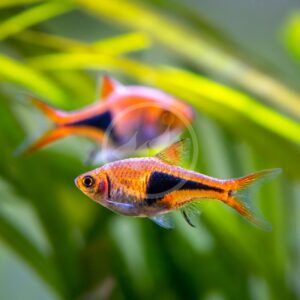
RASBORA – HET / HARLEQUIN
Trigonostigma heteromorpha
$5.99 – $8.99Price range: $5.99 through $8.99
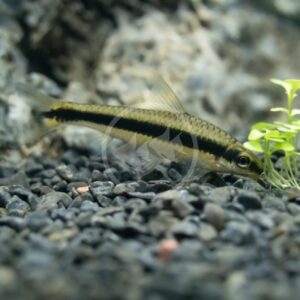
ALGAE EATER – SIAMESE / SAE
Crossocheilus oblongus
$7.99 – $24.99Price range: $7.99 through $24.99
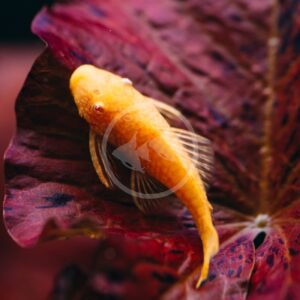
PLECOSTOMUS – BRISTLENOSE ALBINO / GOLD
Ancistrus sp.
$5.99 – $59.99Price range: $5.99 through $59.99
BARB – DENISONII / ROSELINE SHARK
Sahyadria denisonii
$12.99 – $79.99Price range: $12.99 through $79.99
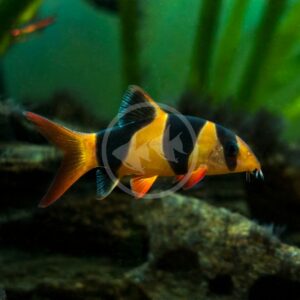
LOACH – CLOWN
Chromobotia macracanthus
$16.99 – $199.99Price range: $16.99 through $199.99
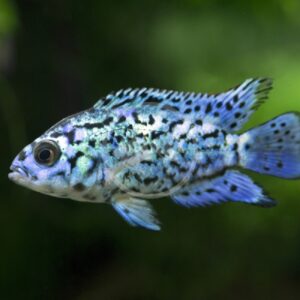
CICHLID – JACK DEMPSEY ELECTRIC BLUE
Rocio octofasciata
$19.99 – $99.99Price range: $19.99 through $99.99
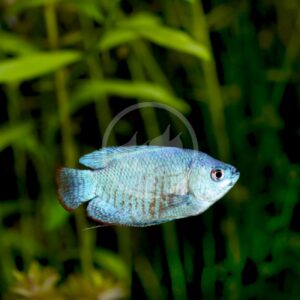
GOURAMI – DWARF POWDER BLUE
Trichogaster lalius
$11.99 – $14.99Price range: $11.99 through $14.99
